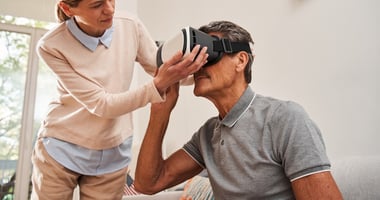Low-Cost VR Intervention Found to Benefit Patients With Acrophobia
 |
“[O]ur findings support the hypothesis that a fully self-guided app-based VR-CBT, which can be done at home at a fraction of the cost of existing evidence-based treatment options, strongly reduces acrophobia symptoms,” wrote Tara Donker, Ph.D., and colleagues at Vrije Universiteit in Amsterdam. “The current study adds to the development of innovative and scalable delivery methods of evidence-based treatments and underlines that new technologies have the potential to transform mental health care worldwide.”
Donker and colleagues enrolled 193 adults with acrophobia (scoring at least 45.45 on the Acrophobia Questionnaire [AQ]-Anxiety) to receive either the active VR treatment or be placed on a wait list. The smartphone-based VR program, known as ZeroPhobia, provides six animated game-like modules that incorporate CBT principles and techniques. ZeroPhobia was downloaded on the participants’ existing smartphones, and VR was simulated with $10 cardboard goggles. Participants could use the program at home or in another natural environment, but they had to complete all six modules within three weeks.
After three weeks, AQ-Anxiety scores dropped from an average of 68.62 to 39.55 in the ZeroPhobia group, compared with a drop from 67.91 to 60.41 in the wait-list group. The strong symptom improvements were maintained at a follow-up assessment three months later. Aside from some transient cases of cyber sickness (headaches and dizziness), the participants found the VR intervention to be tolerable and user friendly.
“One of the key strengths of the present study was its ecological validity because the intervention was conducted in the participants’ natural environments instead of a research laboratory,” Donker and colleagues wrote. “Furthermore, participants received no guidance when using the VR-CBT app or filling in assessments, thereby ruling out any influence of human contact.”
To read more about VR-based phobia therapies, see the Psychiatric News article, “Avatar-Guided VR Therapy for Fear of Heights Shows Promise.”
(Image: PeopleImages/istock.com)






